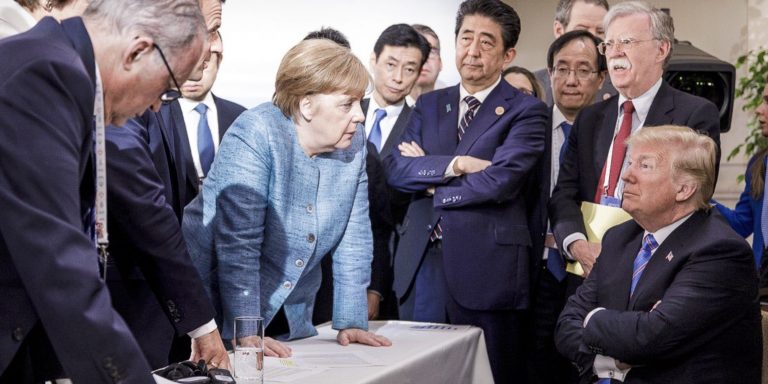INTELBRIEF
June 11, 2018
IntelBrief: Tension in the G7

- There was clear tension between President Trump and other leaders during the G7 summit in Canada.
- The unprecedented disdain culminated with the U.S. refusing to sign the joint statement already agreed upon at the summit’s conclusion.
- Flying from the summit, President Trump tweeted that Canadian Prime Minister Trudeau was ‘very dishonest and weak.’
- While the bond between the U.S. and its closest allies can survive any one administration, this level of disagreement is unprecedented.
.
The ‘America First’ doctrine of the Trump Administration collided with the multilateral, consensus-based approach of the Group of Seven (G7). The countries of the G7 are America’s closest allies—France, Britain, Canada, Japan, Italy and Germany—and the spectacle of the U.S. president engaged in name-calling and threatening a full trade war is unprecedented and damaging to more than just the unity of the G7.
The issue of trade has dominated relations between the U.S. and many of its closest partners for months. Utilizing his preferred method of communication, Trump has sent near-daily tweets about how the European Union is taking advantage of the U.S.—the world’s largest economy and the country that helped establish and lead institutions such as the World Trade Organization. Before traveling to the summit, President Trump had already made a public step away from the unity of the G7, saying that Russia should be part of the group and should attend the meeting. Russia had once been part of the ‘G8’ but was expelled by the others after its illegal annexation of Crimea and its military actions in eastern Ukraine.
While the issue of trade is dominating the headlines, it is only the most high-profile part of a larger disagreement between President Trump and the Europeans. President Trump has been consistent in disparaging a multilateral, consensus-based approach to resolving complex international issues. Climate change is among the largest issues facing the global community about which the U.S. has positioned itself in direct opposition with the G7. Relations between the U.S. and the other members of the G7 will not completely rupture, but this newest incident will further cement in the minds of U.S. allies and rivals alike that the U.S. is simply no longer the leader it once was. Trump has proffered a victim narrative, railing against perceived injustices in which the U.S. is always the injured party.
President Trump’s new National Security Advisor, John Bolton, tweeted a photo of the U.S. president with his arms crossed, while other heads of state, including Germany’s Chancellor Merkel, leaning toward him with the words ‘Just another #G7 where other countries expect America will always be their bank. The President made it clear today. No more.’ The damage being done to long-standing alliances is significant and it appears unlikely the U.S. administration will change its current path of confrontation over compromise anytime soon.
.
For tailored research and analysis, please contact: info@thesoufancenter.org
[video poster="https://thesoufancenter.org/wp-content/uploads/2018/06/AP_18160750063030.jpg" width="960" height="540" mp4="https://thesoufancenter.org/wp-content/uploads/2018/06/Final-Edit-1-212.mp4"][/video]